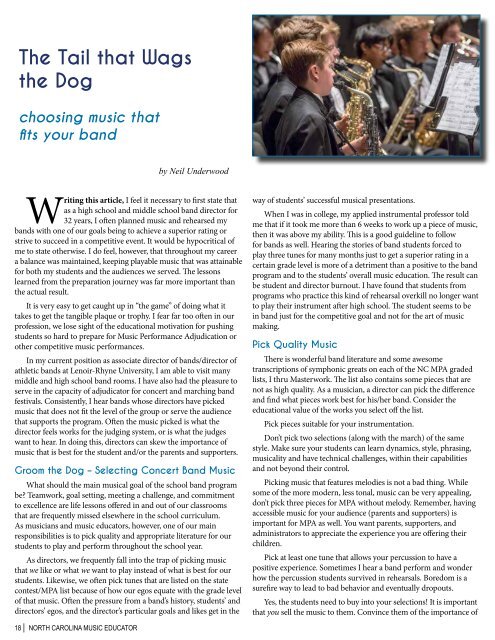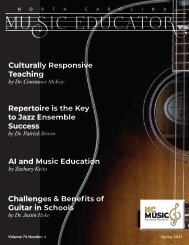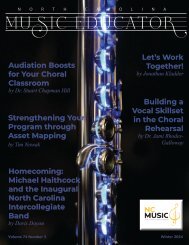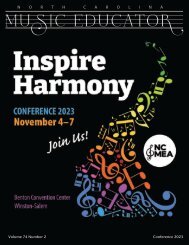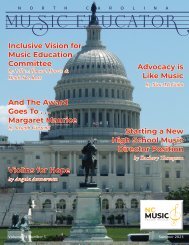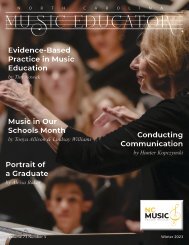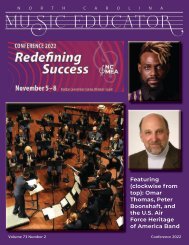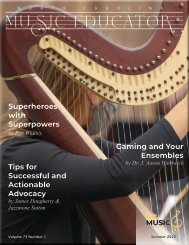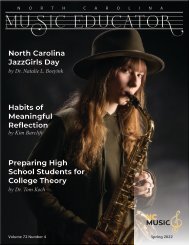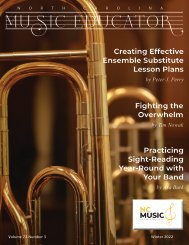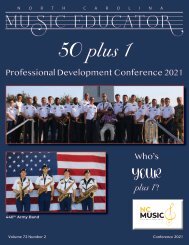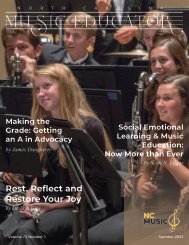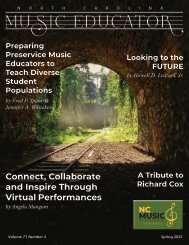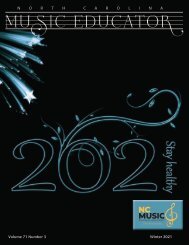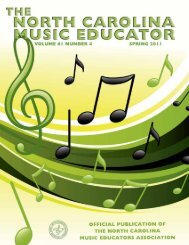NC Music Educator Spring 2018
North Carolina Music Educators Association Journal Spring 2018
North Carolina Music Educators Association Journal Spring 2018
You also want an ePaper? Increase the reach of your titles
YUMPU automatically turns print PDFs into web optimized ePapers that Google loves.
The Tail that Wags<br />
the Dog<br />
choosing music that<br />
fits your band<br />
by Neil Underwood<br />
Writing this article, I feel it necessary to first state that<br />
as a high school and middle school band director for<br />
32 years, I often planned music and rehearsed my<br />
bands with one of our goals being to achieve a superior rating or<br />
strive to succeed in a competitive event. It would be hypocritical of<br />
me to state otherwise. I do feel, however, that throughout my career<br />
a balance was maintained, keeping playable music that was attainable<br />
for both my students and the audiences we served. The lessons<br />
learned from the preparation journey was far more important than<br />
the actual result.<br />
It is very easy to get caught up in “the game” of doing what it<br />
takes to get the tangible plaque or trophy. I fear far too often in our<br />
profession, we lose sight of the educational motivation for pushing<br />
students so hard to prepare for <strong>Music</strong> Performance Adjudication or<br />
other competitive music performances.<br />
In my current position as associate director of bands/director of<br />
athletic bands at Lenoir-Rhyne University, I am able to visit many<br />
middle and high school band rooms. I have also had the pleasure to<br />
serve in the capacity of adjudicator for concert and marching band<br />
festivals. Consistently, I hear bands whose directors have picked<br />
music that does not fit the level of the group or serve the audience<br />
that supports the program. Often the music picked is what the<br />
director feels works for the judging system, or is what the judges<br />
want to hear. In doing this, directors can skew the importance of<br />
music that is best for the student and/or the parents and supporters.<br />
Groom the Dog – Selecting Concert Band <strong>Music</strong><br />
What should the main musical goal of the school band program<br />
be? Teamwork, goal setting, meeting a challenge, and commitment<br />
to excellence are life lessons offered in and out of our classrooms<br />
that are frequently missed elsewhere in the school curriculum.<br />
As musicians and music educators, however, one of our main<br />
responsibilities is to pick quality and appropriate literature for our<br />
students to play and perform throughout the school year.<br />
As directors, we frequently fall into the trap of picking music<br />
that we like or what we want to play instead of what is best for our<br />
students. Likewise, we often pick tunes that are listed on the state<br />
contest/MPA list because of how our egos equate with the grade level<br />
of that music. Often the pressure from a band’s history, students’ and<br />
directors’ egos, and the director’s particular goals and likes get in the<br />
way of students’ successful musical presentations.<br />
When I was in college, my applied instrumental professor told<br />
me that if it took me more than 6 weeks to work up a piece of music,<br />
then it was above my ability. This is a good guideline to follow<br />
for bands as well. Hearing the stories of band students forced to<br />
play three tunes for many months just to get a superior rating in a<br />
certain grade level is more of a detriment than a positive to the band<br />
program and to the students’ overall music education. The result can<br />
be student and director burnout. I have found that students from<br />
programs who practice this kind of rehearsal overkill no longer want<br />
to play their instrument after high school. The student seems to be<br />
in band just for the competitive goal and not for the art of music<br />
making.<br />
Pick Quality <strong>Music</strong><br />
There is wonderful band literature and some awesome<br />
transcriptions of symphonic greats on each of the <strong>NC</strong> MPA graded<br />
lists, I thru Masterwork. The list also contains some pieces that are<br />
not as high quality. As a musician, a director can pick the difference<br />
and find what pieces work best for his/her band. Consider the<br />
educational value of the works you select off the list.<br />
Pick pieces suitable for your instrumentation.<br />
Don’t pick two selections (along with the march) of the same<br />
style. Make sure your students can learn dynamics, style, phrasing,<br />
musicality and have technical challenges, within their capabilities<br />
and not beyond their control.<br />
Picking music that features melodies is not a bad thing. While<br />
some of the more modern, less tonal, music can be very appealing,<br />
don’t pick three pieces for MPA without melody. Remember, having<br />
accessible music for your audience (parents and supporters) is<br />
important for MPA as well. You want parents, supporters, and<br />
administrators to appreciate the experience you are offering their<br />
children.<br />
Pick at least one tune that allows your percussion to have a<br />
positive experience. Sometimes I hear a band perform and wonder<br />
how the percussion students survived in rehearsals. Boredom is a<br />
surefire way to lead to bad behavior and eventually dropouts.<br />
Yes, the students need to buy into your selections! It is important<br />
that you sell the music to them. Convince them of the importance of<br />
quality, appropriate levels, and “fit” for your band. You know what is<br />
best for the band. Pick music accordingly.<br />
Quality music is important for all concerts you present. Make<br />
sure music selected for fall, winter/holiday, spring and year-end<br />
concerts has quality scoring, content, style, and is still educational for<br />
your students. It isn’t wrong to play popular music, but make sure it<br />
is a quality arrangement and fits your group. There is nothing worse<br />
than a poorly written pop tune played by a band with no chance of<br />
making it sound good. This leads to students feeling embarrassed<br />
and having negative opinions of band.<br />
Here’s an idea to keep MPA prep from becoming boring –<br />
Challenge your students by adding a concert of easier music in early<br />
to mid-February. This will keep students – and directors – from<br />
burning out on MPA music. It is great for sight-reading, and the<br />
parents and community can really enjoy it.<br />
What Should Wag the Tail?<br />
My focus in this article will not stray beyond<br />
the two major ensembles existing in most<br />
<strong>NC</strong> band programs: concert and marching<br />
bands. The only point I make on this subject<br />
is that directors should remember to keep the<br />
main thing, the main thing. The school’s other<br />
ensembles can be great outlets and educational<br />
activities for students. The concert band,<br />
however, must remain the central foundation<br />
and focus of quality school band programs.<br />
Marching band can be an extension of the<br />
concert band that provides the school and<br />
community with a source of musical pride and<br />
excitement, but never allow the teaching of music in the classroom to<br />
become secondary to the other “stuff ” – the tail that wags.<br />
The Tail – Selecting <strong>Music</strong> for Marching Band<br />
I am a firm believer in the thought process and planning that<br />
must go into creating a musical and visual package that challenges<br />
students, provokes their creativity, and entertains audiences, while<br />
gaining credit in a competitive environment.<br />
A concern shared by me and many colleagues over the past few<br />
years has been the general lack in the quality of music being selected<br />
to perform in many of these shows. Again, but even more than in<br />
concert band music, melodic line and the general idea of musical<br />
phrase is becoming less and less apparent from some of our most<br />
popular band arrangers. While the <strong>Music</strong> Effect caption can often be<br />
easily satisfied by using “sound-effect” music with mere accents and<br />
sudden dynamic changes, I question the educational value of this<br />
music.<br />
Paying royalties to have quality music arranged can be quite<br />
expensive, not to mention the cost of the arrangements alone.<br />
Expense has been an excuse for some bands and arrangers to<br />
simply make-up simple tunes, give it rhythmic content, write cool<br />
percussion and electronic background, give it a name and theme and<br />
you’ve got a show. I heard a band last fall who played an entire show<br />
with the winds using only the notes of the Bb scale. The percussion,<br />
electronics and guard were great. But the wind players were subpar<br />
at best. I question what these students actually learned musically and<br />
felt the focus of what the program was achieving was all off balance.<br />
This was a prime example of tail wagging the dog.<br />
“There should be a<br />
sign in front of each<br />
drum and bugle corps<br />
performance that<br />
states ‘Band Directors,<br />
DON’T TRY THIS AT<br />
HOME!’”<br />
There are some very fine arrangements and marching band<br />
compositions that are published as stock-charts. Some of the better<br />
arrangements are the “old stuff ” that can be adapted to fit today’s<br />
marching bands. Seek quality music first. If you are fortunate enough<br />
to have original music or arrangements written for your band, I<br />
encourage you to demand music with melodic lines and not just<br />
rhythmic effects. Your students and fans will thank you.<br />
Many band directors feel marching band has become a game of<br />
haves and have-nots. While regrettably, there is some truth to this<br />
statement, I feel strongly that bands without large budgets can be<br />
just as good and still play quality music and achieve effects that work<br />
in today’s marching band. The thought process must take place in<br />
planning an intelligent, put-together, and entertaining show. It’s not<br />
about the props and money spent. It is about the quality, creativity<br />
and planning. But first, it’s about how well bands play and march.<br />
For many years, high school bands have<br />
tried to emulate and often copy what is seen<br />
each summer at the latest DCI show. A highly<br />
respected colleague and friend has said to me<br />
on numerous occasions, “There should be a<br />
sign in front of each drum and bugle corps<br />
performance that states ‘Band Directors,<br />
DON’T TRY THIS AT HOME!’” There is<br />
a huge difference in what and how they do<br />
the drum corps activity from that of a high<br />
school band. While we can emulate and even<br />
copy some of their ideas, we should never<br />
strive to turn our bands into what they do<br />
each summer. It is our responsibility as music<br />
educators to remember our priorities to the students and to music in<br />
our profession.<br />
As band directors, we have multiple responsibilities and wear<br />
many hats. Our jobs are not easy. We must remember our first<br />
responsibility is to provide a safe and educational environment<br />
for our students to excel in music and in life skills. We must not<br />
allow external factors to taint our judgement of what is best for<br />
our students, specifically the quality of education and music<br />
opportunities we provide in all elements of our programing. It is our<br />
duty to never allow the tail to wag the dog.<br />
Neil Underwood is the associate director of bands/<br />
director of athletic bands at Lenoir-Rhyne University<br />
in Hickory. Prior to Lenor-Rhyne, he served as<br />
director of bands at North Lincoln High School<br />
in Lincolnton, and at East Lincoln High School in<br />
Denver, <strong>NC</strong>. His bands have received 51 superiors in<br />
North Carolina MPA Festivals in concert, marching<br />
and jazz band. Serving as president of the North Carolina Bandmaster’s<br />
Association 2002-04, Underwood was also Teacher of the Year for Lincoln<br />
County Schools, and received the <strong>NC</strong> Citizenship Teacher of the Year.<br />
In 2013, he was recognized as one of SBO Magazine’s 50 Directors Who<br />
Make A Difference. He serves as an adjudicator and clinician for bands<br />
throughout the southeast.<br />
18 | NORTH CAROLINA MUSIC EDUCATOR NORTH CAROLINA MUSIC EDUCATOR | 19


